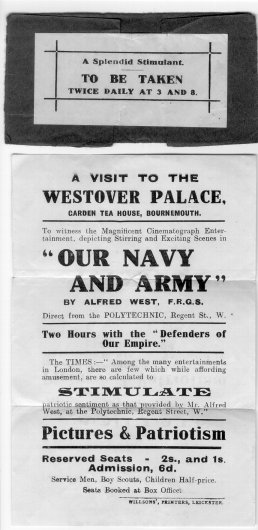West's 'Our Navy' at
The Regent Street
Polytechnic
www.ournavy.org.uk
Webmaster:
David
Clover
Our Navy's Regent Street 'Home'
Alfred West regarded the cinema theatre at the Regent Street Polytechnic (now the University of Westminster) as its London 'home' for many years.
The name of 'The Regent Street Polytechnic' or 'Polytechnic, London' appeared frequently and prominently on reviews, promotional articles, and the advertising materials and flyers for the company, not just in the many towns across the UK where they were exhibited, but it was relied on heavily as an indicator of quality in all the countries in which the 'Our Navy' material was exhibited.
A few examples are shown below including one from a tour made to Hobart in 1901.
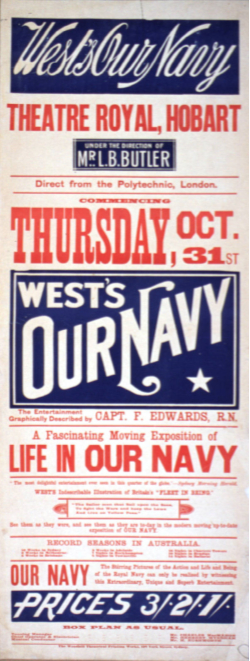
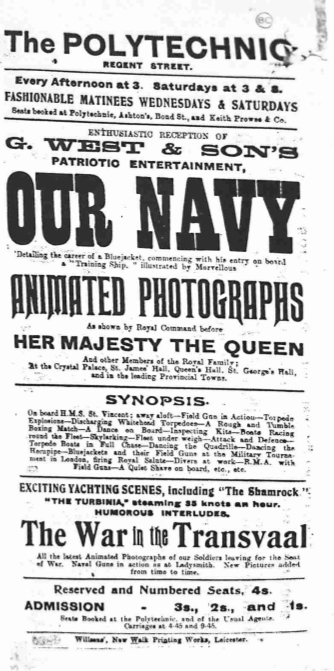
Sponsored seat for Alfred West
Following the redevelopment and re-opening of the cinema in 2015, a seat has been paid for by the family and named in his honour (Row K, Seat 7).
References to'The Polytechnic'
In his Autobiography Alfred West wrote:
"There are still many who have happy recollection of my films which, under the title of “Our Navy”, were shown for fourteen years at the Polytechnic, Regent Street, and throughout this country and Colonies." (Sea Salts and Celluloid, Foreword)
- The Magic Screen A 2015 history of the Regent Street Cinema including a summary of Alfred West's work on page 118 and other references through the text (ISBN 978-0-9576124-6-4)
- BBC Feature on the Cinema at Regent Street - including high-resolution photographs of the 'Great Hall' (N.B. this is an old productioun and requires the deprecated Adobe Flash plugin)
- Regent Street Polytechnic Cinema Restoration Project
'Our Navy revived'
At the
Regent Street Polytechnic Cinema
On Wednesday 3 October 2012, a talk was given at the original cinema (now in the University of Westminster at 309 Regent Street) about the work of Alfred J West and the 'Our Navy' shows.
The presentation was sponsored by the:
Part 1
Part 2
Regent Street Polytechnic - home of AJ West's 'Our Navy' from David Clover on Vimeo.
%20700px.jpg)
Poster for talk on 3 October 2012 to be
given in the exact location where Alfred West showed 'Our Navy' in London's
Regent Street (click for full size poster)
Polytechnic Shows
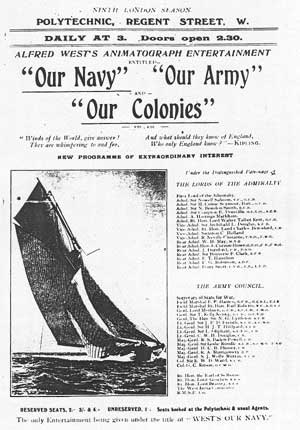
Handbill advertising cinematograph
exhibitions at the Polytechnic Regent Street c: 1910
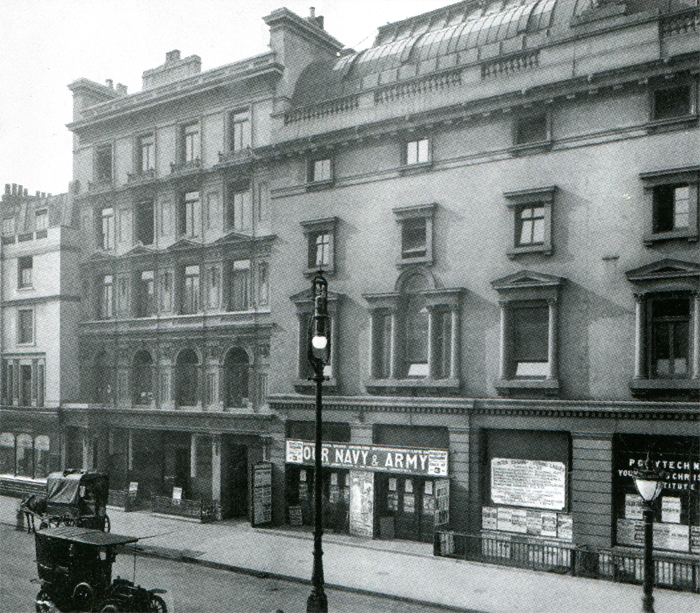
The Regent Street Polytechnic showing
Theatre entrance and 'Our Navy' advertisement
(Picture Courtesy of the University
of Westminster)
"The Secretary of the Navy League told me that such an entertainment should remain permanently in London, but the only question was to find a hall. He suggested the Polytechnic in Regent Street, and after an interview with the Directors they agreed to let their hall to me, and at this address under the title of “Our Navy” the show came to anchor and remained there for 14 years. Each year new pictures were added or substituted on the programme, the Admiralty affording me special facilities to obtain them. It was recognised that besides acting as an incentive to the right class of recruit such an entertainment would prove of great value in popularizing the service. The films were only shown at the Polytechnic in the afternoons from 3 till 5, so that the evenings were free for booking elsewhere." (Sea Salts and Celluloid p36)
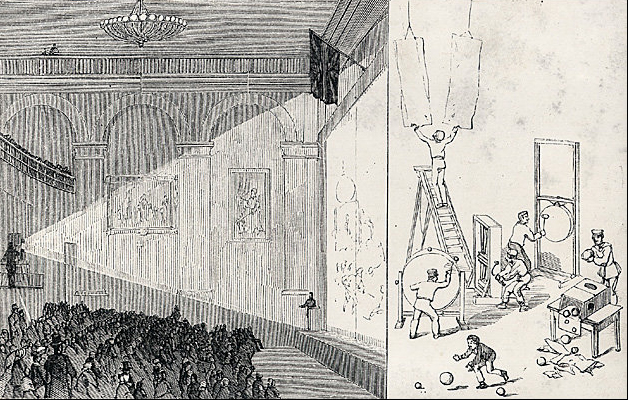
Sound effects at Regent Street
(Picture Courtesy of the
University of Westminster. NB - this picture depicts the earlier design of the cinema before the 1893 rebuilding and before the arrival of 'Our Navy'.)
"I decided to act as compère myself and to introduce sound effects, as I considered that it would not do for the audience to see, for instance, a gun fired and hear no report, and so I arranged with someone behind the screen to hit a big drum at the right moment. With such effect was this done that it quite startled the audience, particularly the ladies, and caused roars of laughter. Sheets of coarse sandpaper rubbed together gave a realistic enough impression of the splashing of waves, and words of command delivered at the right juncture unknowingly anticipated the ‘talkies” of today and added to the appreciation of the films." (Sea Salts and Celluloid p16)
"Realism was further enhanced by the effects behind the screen. Three men were kept hard at work beating drums to represent gun fire, knocking chains and other metal objects about, and generally making a terrible din." (Sea Salts and Celluloid p40)
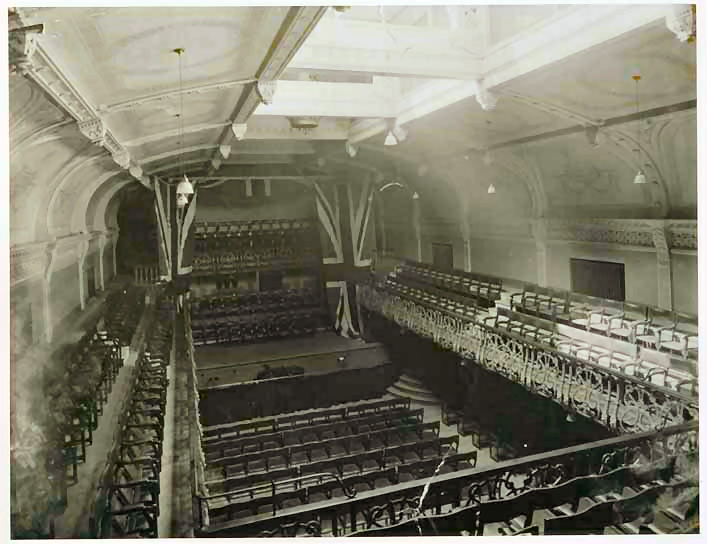
The
Regent Street Polytechnic Theatre - Circa 1900
(Picture Courtesy of the
University of Westminster)
Advertising
|
|
Viral' advertisement in the
guise of a Seltzer Powder which, when opened, displays an advertisement
for 'Our Navy'. Versions of this advertisement were designed for the
Regent Street Polytechnic film shows and left on buses and in cafes and public
places to be found and opened by the curious.
This example, for a Bournemouth showing, nonetheless makes reference to 'Direct from the POLYTECHNIC' as the principal UK venue; the show became closely identified with the London location worldwide as Alfred West regarded it as the best known and most prestigious of the 'Our Navy' venues.
|
Sandwich board men were dispatched across London to advertise the shows, but Our Navy also created a large wooden ship model 13' 6" in length, christened 'King Edward VIII' which was towed around London and other cities carrying bill boards and advertisements for the Polytechnic and local shows. Unfortunately this fell foul of London byelaws, and West was told that he would be prosecuted if he continued to use it for advertising as the great crowds it attracted caused serious disruption to traffic. The model eventually featured in several film sequences and it was eventually blown up and destroyed for dramatic effect.
Finances
Although it is purely speculative, based on a 100 seat auditorium with suitable banding of prices and a full house, the seat prices quoted above can be converted to 2011 income approximations as follows:| Seats | 1900 price | 2011 equivalent | 2011 Total |
| 10 | 4/- | £19.00 | £190 |
| 20 | 3/- | £14.20 | £284 |
| 30 | 2/- | £9.50 | £285 |
| 50 | 1/- | £4.70 | £235 |
| Income per showing | £994 |
Assuming a full house of around 100 seats, and 9 performances a week, we can estimate an equivalent 'takings' in 2011 prices for the week at GBP 9000. On an annual season of 25 weeks that equates to takings of around GBP 223,000 a year from the Polytechnic business alone. West was showing across the whole UK, and it's not unreasonable to assume that figure could be tripled or more if income from all the other UK shows are taken into account. Sadly, 'Our Navy' Ltd account books do not survive.
Clips and Reviews - University of Westminster Archive
Recent research in the archives of the University has revealed more clips and reviews - including one relating to the world cruise of the Ophir in 1901. The material was being shown at the Regent Street Polytechnic in 1902.
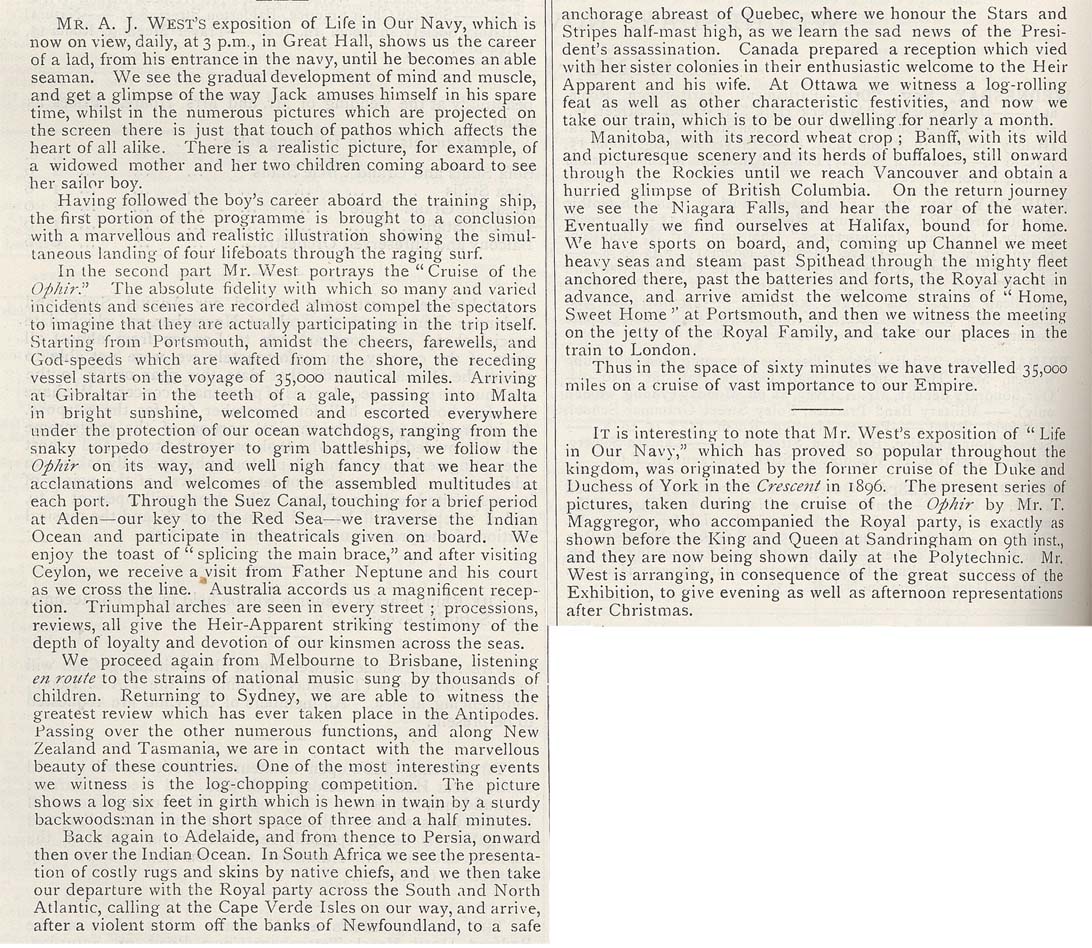
Reference: University of Westminster Archive
Services, Polytechnic Magazine vol. XXXIX, 20th November 1902, p210
These contemporary reports are also taken from University of Westminster Archives by kind permission.
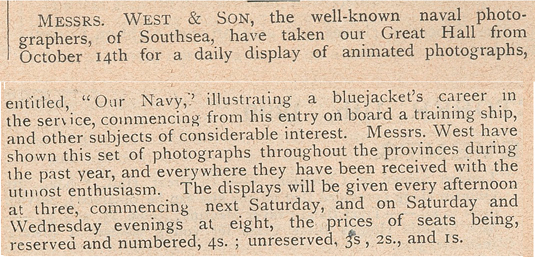
University of Westminster Archive Services, Polytechnic Magazine vol. XXXV,
11th October 1899, p173-174

University of Westminster Archive Services,
Polytechnic Magazine vol. XXXV, 18th October 1899, p190

